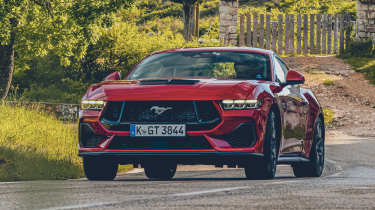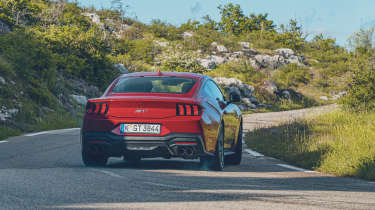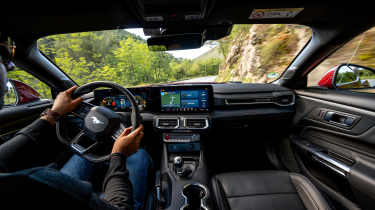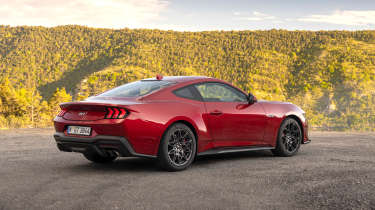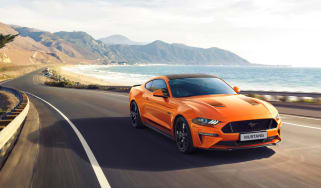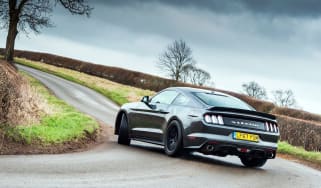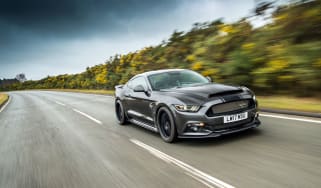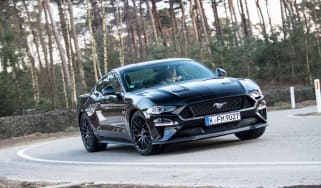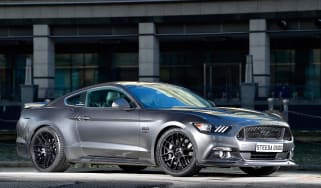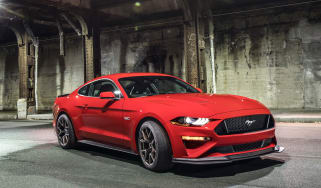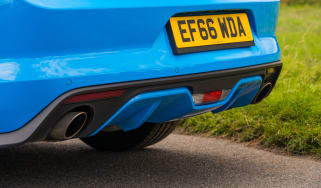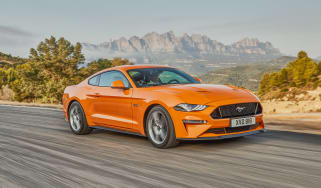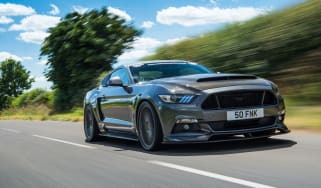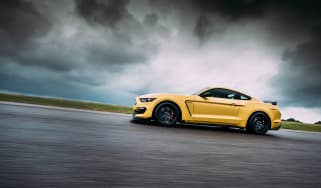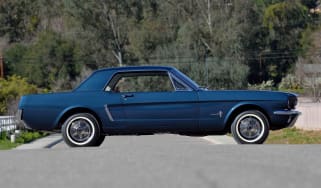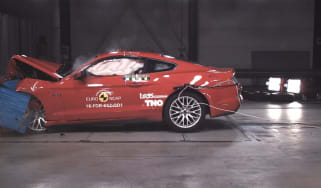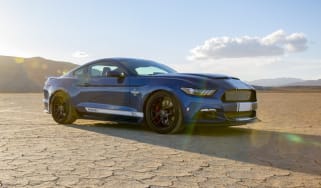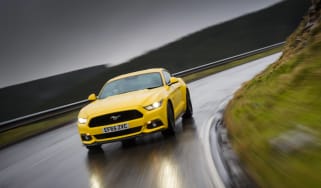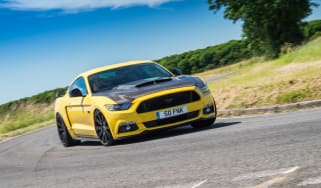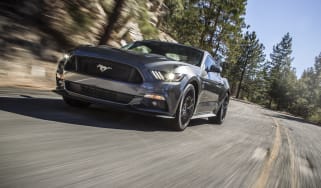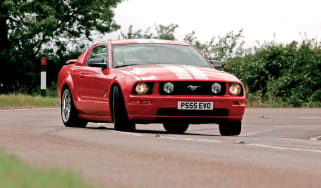Ford Mustang GT 2024 review – old school in all the right ways
We loved the new Ford Mustang in track-focused Dark Horse form – how does the standard GT fare?
The new Ford Mustang is here, and it represents something important – a chance to step away from the horsepower races to experience an analogue, naturally aspirated V8 coupe at a time when legislation is forcing them out of existence. We first drove the new Mustang in Dark Horse form in the US last year, when deputy editor James Taylor concluded that it was ‘as charismatic a road car as ever’. Here, we'll find out if that holds true for the entry-level GT on the more ragged, technical roads of southern France, with a UK drive to follow.
With the track-prepped Dark Horse and the unhinged GTD road racer, Ford clearly wants us to take the S650-generation Mustang seriously, but it's equally keen to stress that the GT version is absolutely, positively not a track car. It doesn't have the Dark Horse’s beefed up transmission, more focused damper tuning nor its improved cooling package and uprated 447bhp V8, cutting the price down from £67,995 to £55,725 to make this by far the most affordable Mustang, one that’s best suited for the road.
Few European customers chose the four-cylinder EcoBoost engine in the old Mustang, so this time it’s a V8 or nothing. We like that. The 5-litre Coyote unit has been revised for the new GT, with dual-intake throttle bodies, a new induction system and new cams. The result? 440bhp, compared to the old car’s 444 (although torque is up by 8lb ft to 398). You can blame tightening European emissions regulations for the power decrease, and the fact that US-spec GTs get an extra 46bhp. But if that’s what it costs to sell a naturally aspirated V8 coupe in Europe in 2024, then so be it.
More reviews
The engine is linked up to a six-speed manual gearbox as standard (the Dark Horse gets a more robust Tremec six-speeder), but you can opt for a 10-speed automatic for an extra £2000. The auto has much shorter gearing, which does give you more opportunities to extend the engine, but it can be a little indecisive when juggling through ratios and isn’t that crisp when using the paddles (particularly on downshifts). The manual, on the other hand, clunks into gear with a heavy, positive action and suits the character of the Mustang better, even though it means the car is four-tenths slower to reach 62mph with a time of 5.3sec.
The GT takes up a lot of space on the tight, twisting roads of the French Riviera, but when you have more room to play with, it starts to click. It always feels like a big, 1836kg car, no doubt about it, but you can wring more performance out of the car, finding a flow and stretching the V8 right through the rev range. It really is a lovely engine, smooth yet with real bite to the soundtrack that makes you wonder whether Ford has taken any notice of European noise regulations at all. With the valved exhaust opened up it snorts and rumbles at low revs, and while it doesn't surge forward with the intensity of a turbocharged V8, the torque build-up is linear and very manageable. In the manual, second gear takes you up to 80mph so you often end up short-shifting and using the mid-range rather than battering the red line. There's not a ripping top end to be enjoyed, though, so you don't feel like you're missing out on much.
There are modes galore in the new Mustang, from Normal through Sport and up to Track, with Slippery and Drag modes added in for good measure. You can mix and match settings for the steering, throttle map and damping (if you've specified the £1750 MagneRide dampers), but Sport feels cohesive out of the box. There's a bit more steering weight to work against, the engine has sharper pick-up and the dampers hold tighter control of all that weight, giving you more confidence to lean against the grip from the Pirelli P Zeros. On warm, dry tarmac the front end finds good bite unless you overcommit with your entry speed, but you find the limits through trust rather than feel; the steering is mute and there isn’t much information coming through the chassis, but the Mustang’s fundamental balance is as friendly as ever, so there are no surprises unless you really push your luck.
In fact, as my confidence grows I almost want the Mustang to bite back and show its wilder side. The GT looks and sounds like it should be a bit lairy, a bit of a challenge, but the handling is secure and restrained right up to the limit. Even out of first-gear hairpins the 275-section rear tyres can take almost every ounce of torque from the V8, so you use the throttle to subtly adjust the balance through a corner rather than having complete command over it. In the damp you can get the limited-slip diff working harder, but just as you feel the Mustang coming alive, the balance transitions back to neutral quite quickly. After poking the bear for a few corners I settle into how the Mustang prefers to be driven. Be smooth, wait for the outside tyres to take the load, and then it’s a matter of spotting your exit, feeding in the power and letting the engine sing between corners. There are more sensory rewards than in a BMW M2, but there isn’t the BMW’s sharpness or expressive balance to be enjoyed beyond that.
Not an out-and-out thriller then, but that doesn't mean that the GT isn't a satisfying car to drive. In fact, it's hard to think of many sub-£60k cars that dust every journey with such a sense of occasion. The Mustang’s engine is a big part of this of course, but there's depth here – the gearbox is a delight to use, the steering response is crisper than on the old GT and the brake pedal is firm with great bite (if anything it's a touch too sharp, making smooth heel-and-toe shifts a little tricky). All of this makes the GT a treat when you aren't going quickly, so too the ride on the MagneRide dampers. They're firm even in their softest setting but the ride isn't brittle or crashy, and at a cruise they help the Mustang feel settled and keyed in. It’s a quiet car inside too, with an active noise cancelling system that dials out unwanted noise without diluting the wonderful V8 backing track – in fact, it’s amplified by the lack of other sounds. These are the makings of an excellent long-distance GT, which is fitting I suppose.
Ford is making plenty of noise about the new Mustang’s step forward in interior tech, but I can’t help feeling that something has been lost in moving to the same ‘two massive screens’ solution as employed by every other manufacturer these days. The classic-style eyebrow arches on the dash in the old car have gone, in their place a generic design with the displays tacked on, and there really isn’t much to suggest that you’re in a Mustang. The exterior is a different story. While I’m parked fiddling with the HMI a schoolboy shouts ‘J’aime ta voiture, monsieur!’ from across the street, a reminder that the GT has all the presence and charisma a muscle car should.
The central touchscreen is where you configure your drive-mode profiles, which include a variety of options for the instrument layout ahead of you. Track mode serves up a horizontal rev bar across the display, but the ’80s-style ‘Fox Body’ dials are the simplest and clearest to read. You cycle through the drive modes using handy buttons on the new, thicker-rimmed steering wheel, and mercifully there’s a shortcut on the wheel to turn off the lane keep assist, which you need to do at the start of every drive. Not even the analogue, old-school Mustang can escape that. Another concession to modernity is the fitment of an electronic handbrake in place of the old manual item, with an optional ‘drift brake’ lever designed specifically for making handbrake turns. You need a track to use it in anger (which we didn’t have), but it certainly beats a fiddly plastic switch. Otherwise, the driving position is low and cocooned, the standard seats are comfortable (if much less supportive than the optional Recaros) and while the interior does feel built down to a price, it doesn't feel as cheap as it used to.
The GT really is an easy car to fall for, and it’s one you sense Ford is pulling out all the stops to continue selling in the UK. Average fleet emissions regulations mean that Ford must limit the supply of Mustangs in Europe to avoid fines, and theoretically they could produce more than they do to satisfy demand. That demand is only likely to grow with this new model, because there really isn’t an alternative if you want a manual, rear-drive, naturally aspirated V8 coupe in 2024. In fact, the GT’s most obvious competitor comes from Ford’s own stable – the Dark Horse.
The Dark Horse effectively replaces the old Mach 1, which marked the point when the last-gen Mustang really began to gel as a driver’s car. Good news for the new GT (and perhaps bad if you’ve ordered a Dark Horse) is that purely for road use, the gap between the two is much narrower this time around. When driven back-to-back the Dark Horse’s unique MagneRide damper calibration and Torsen rear diff do bring some more clarity and control but there isn’t noticeably more bite to the driving experience.
My internal G-sensor perhaps felt a little more push from the Dark Horse’s extra 7bhp, but the engine feels and sounds pretty much identical. The price premium mostly goes towards making the Dark Horse more durable for the track, with a tougher gearbox, a standard auxiliary engine cooler, bespoke radiator and a rear axle cooler, but if you can do without those, the GT is excellent value and still provides the best bits of the Mustang experience. These days, it’s an experience you won’t find anywhere else.

